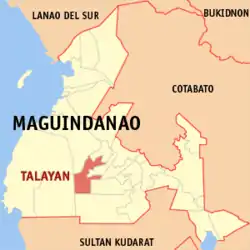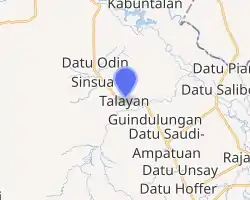Talayan
Talayan, officially the Municipality of Talayan (Maguindanaon: Ingud nu Talayan; Iranun: Inged a Talayan; Tagalog: Bayan ng Talayan), is a 4th class municipality in the province of Maguindanao, Philippines. According to the 2015 census, it has a population of 30,032 people. [3]
Talayan | |
|---|---|
| Municipality of Talayan | |
 Map of Maguindanao with Talayan highlighted | |
OpenStreetMap 
| |
.svg.png.webp) Talayan Location within the Philippines | |
| Coordinates: 6°59′04″N 124°21′23″E | |
| Country | |
| Region | Bangsamoro Autonomous Region in Muslim Mindanao (BARMM) |
| Province | Maguindanao |
| District | 2nd District |
| Founded | September 22, 1976 |
| Barangays | 15 (see Barangays) |
| Government | |
| • Type | Sangguniang Bayan |
| • Mayor | Ali M. Midtimbang |
| • Vice Mayor | Datu Ali S. Midtimbang Jr. |
| • Representative | Esmael G. Mangudadatu |
| • Electorate | 11,377 voters (2019) |
| Area | |
| • Total | 143.84 km2 (55.54 sq mi) |
| Elevation | 34 m (112 ft) |
| Highest elevation | 179 m (587 ft) |
| Lowest elevation | 3 m (10 ft) |
| Population | |
| • Total | 30,032 |
| • Density | 210/km2 (540/sq mi) |
| • Households | 2,390 |
| Economy | |
| • Income class | 4th municipal income class |
| • Poverty incidence | 60.04% (2015)[4] |
| • Revenue | ₱52,196,053.26 (2016) |
| Service provider | |
| • Electricity | Maguindanao Electric Cooperative |
| Time zone | UTC+8 (PST) |
| ZIP code | 9612 |
| PSGC | |
| IDD : area code | +63 (0)64 |
| Climate type | tropical climate |
| Native languages | Maguindanao Tagalog |
| Website | www |
Talayan was created through Presidential Decree No. 1009 by then President Ferdinand Marcos on September 22, 1976.[5] It was carved from the municipalities of Datu Piang and Dinaig (now Datu Odin Sinsuat).
Datu Udzag Midtimbang was the first appointed mayor of entire Talayan now divided into 4 municipalities, Talitay, Datu Anggal, Talayan and Guindulungan. followed by a younger brother Datu Antao, and now Datu Ali. With these leaders, Talayan now and then remains as a place for everybody. Many projects now serve the public like concrete roads and lights in every home. A new public market is now being constructed under the leadership of Mayor Hadji Datu Ali.
Geography
Barangays
Talayan is politically subdivided into 15 barangays.
- Boboguiron
- Damablac
- Fugotan
- Fukol
- Katibpuan
- Kedati
- Lanting
- Linamunan
- Marader
- Binangga North
- Binangga South
- Talayan
- Tamar
- Tambunan I
- Timbaluan
Climate
| Climate data for Talayan, Maguindanao | |||||||||||||
|---|---|---|---|---|---|---|---|---|---|---|---|---|---|
| Month | Jan | Feb | Mar | Apr | May | Jun | Jul | Aug | Sep | Oct | Nov | Dec | Year |
| Average high °C (°F) | 31 (88) |
32 (90) |
32 (90) |
32 (90) |
31 (88) |
29 (84) |
29 (84) |
29 (84) |
30 (86) |
30 (86) |
30 (86) |
31 (88) |
31 (87) |
| Average low °C (°F) | 21 (70) |
21 (70) |
21 (70) |
23 (73) |
23 (73) |
23 (73) |
23 (73) |
23 (73) |
23 (73) |
23 (73) |
23 (73) |
22 (72) |
22 (72) |
| Average precipitation mm (inches) | 30 (1.2) |
19 (0.7) |
25 (1.0) |
24 (0.9) |
64 (2.5) |
88 (3.5) |
102 (4.0) |
105 (4.1) |
76 (3.0) |
82 (3.2) |
60 (2.4) |
26 (1.0) |
701 (27.5) |
| Average rainy days | 9.8 | 8.5 | 11.3 | 11.9 | 21.6 | 23.9 | 24.1 | 24.5 | 20.9 | 21.8 | 16.8 | 11.8 | 206.9 |
| Source: Meteoblue (modeled/calculated data, not measured locally)[6] | |||||||||||||
Demographics
| Year | Pop. | ±% p.a. |
|---|---|---|
| 1980 | 18,130 | — |
| 1990 | 42,327 | +8.85% |
| 1995 | 43,286 | +0.42% |
| 2000 | 33,129 | −5.57% |
| 2007 | 25,753 | −3.41% |
| 2010 | 16,042 | −15.82% |
| 2015 | 30,032 | +12.68% |
| Source: Philippine Statistics Authority [3] [7] [8] | ||
References
- Municipality of Talayan | (DILG)
- "Province: Maguindanao". PSGC Interactive. Quezon City, Philippines: Philippine Statistics Authority. Retrieved 12 November 2016.
- Census of Population (2015). "ARMM – Autonomous Region in Muslim Mindanao". Total Population by Province, City, Municipality and Barangay. PSA. Retrieved 20 June 2016.
- https://psa.gov.ph/sites/default/files/City%20and%20Municipal-level%20Small%20Area%20Poverty%20Estimates_%202009%2C%202012%20and%202015_0.xlsx; publication date: 10 July 2019; publisher: Philippine Statistics Authority.
- https://www.officialgazette.gov.ph/1976/09/22/presidential-decree-no-1009-s-1976/
- "Talayan, Maguindanao: Average Temperatures and Rainfall". Meteoblue. Retrieved 19 January 2019.
- Census of Population and Housing (2010). "ARMM – Autonomous Region in Muslim Mindanao". Total Population by Province, City, Municipality and Barangay. NSO. Retrieved 29 June 2016.
- Censuses of Population (1903–2007). "ARMM – Autonomous Region in Muslim Mindanao". Table 1. Population Enumerated in Various Censuses by Province/Highly Urbanized City: 1903 to 2007. NSO.
- "Poverty incidence (PI):". Philippine Statistics Authority. Retrieved 28 December 2020.
- https://psa.gov.ph/sites/default/files/NSCB_LocalPovertyPhilippines_0.pdf; publication date: 29 November 2005; publisher: Philippine Statistics Authority.
- https://psa.gov.ph/sites/default/files/2003%20SAE%20of%20poverty%20%28Full%20Report%29_1.pdf; publication date: 23 March 2009; publisher: Philippine Statistics Authority.
- https://psa.gov.ph/sites/default/files/2006%20and%202009%20City%20and%20Municipal%20Level%20Poverty%20Estimates_0_1.pdf; publication date: 3 August 2012; publisher: Philippine Statistics Authority.
- https://psa.gov.ph/sites/default/files/2012%20Municipal%20and%20City%20Level%20Poverty%20Estima7tes%20Publication%20%281%29.pdf; publication date: 31 May 2016; publisher: Philippine Statistics Authority.
- https://psa.gov.ph/sites/default/files/City%20and%20Municipal-level%20Small%20Area%20Poverty%20Estimates_%202009%2C%202012%20and%202015_0.xlsx; publication date: 10 July 2019; publisher: Philippine Statistics Authority.
